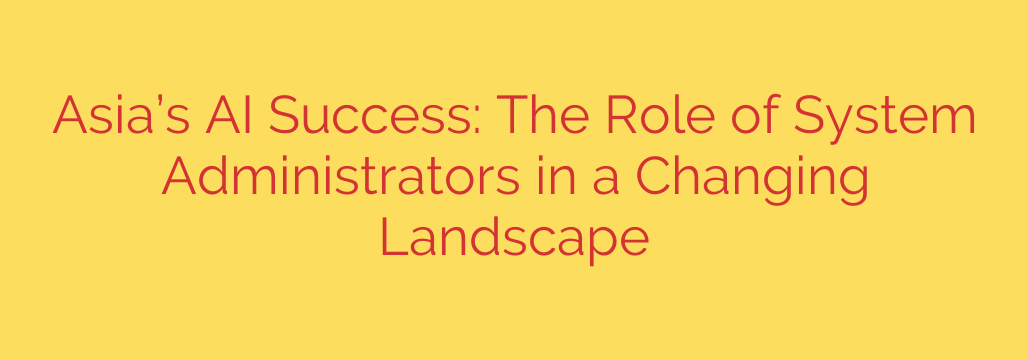
Navigating the AI Revolution: The Evolving Role of System Administrators in Asia
The artificial intelligence boom across Asia is transforming industries, driving innovation, and creating unprecedented economic opportunities. From smart manufacturing in Singapore to advanced fintech in Hong Kong, AI is no longer a futuristic concept but a present-day reality. At the heart of this technological shift is the complex digital infrastructure that powers it all—and the professionals who manage it: system administrators.
While some fear that AI and automation will make traditional IT roles obsolete, the opposite is proving true. The demand for skilled system administrators is not disappearing; it’s evolving. The role is becoming more strategic, more complex, and ultimately, more critical than ever.
From Reactive Maintenance to Proactive Strategy
Historically, the system administrator’s job was often defined by reactive tasks—installing servers, managing user accounts, troubleshooting network issues, and applying patches. It was a crucial role focused on keeping the lights on.
Today, AI-driven environments demand a fundamental shift in this approach. The focus is moving from simply maintaining systems to architecting and optimizing the high-performance infrastructure that AI and machine learning models depend on. Modern sysadmins are no longer just gatekeepers; they are the strategic enablers of innovation. They are tasked with building scalable, resilient, and secure platforms that can handle the immense computational and data-processing demands of AI workloads.
Key Responsibilities for the Modern System Administrator
The rise of AI has introduced a new set of responsibilities that require a blend of classic IT skills and new-age expertise.
Managing High-Performance Computing (HPC) Infrastructure: AI models, especially in deep learning, require massive processing power. System administrators are now responsible for deploying, configuring, and maintaining specialized hardware like GPUs (Graphics Processing Units) and TPUs (Tensor Processing Units). This includes orchestrating complex workloads across on-premise servers and cloud environments to ensure optimal performance and cost-efficiency.
Orchestrating Data Pipelines: AI is fueled by data. A sysadmin’s role now extends to overseeing the data lifecycle. This means ensuring that the data pipelines feeding machine learning models are fast, reliable, and secure. They work closely with data engineers and data scientists to guarantee that massive datasets are accessible, properly stored, and protected from corruption or breaches.
Mastering Automation and Infrastructure as Code (IaC): In a dynamic AI environment, manual configuration is too slow and prone to error. Proficiency in automation tools is non-negotiable. Expertise in platforms like Kubernetes for container orchestration, Ansible for configuration management, and Terraform for Infrastructure as Code allows administrators to deploy and manage complex AI ecosystems with speed and consistency.
Implementing Advanced Security Protocols: AI systems introduce unique security challenges. Beyond traditional network security, administrators must now protect the AI models themselves from tampering, secure vast troves of sensitive training data, and manage access controls for complex, automated systems. Securing the entire AI development and deployment lifecycle is a critical new frontier for system administration.
Essential Skills to Thrive in the AI Era
For system administrators looking to remain indispensable, continuous learning and upskilling are paramount. The focus should be on building a future-proof skill set.
Deep Cloud Competency: A thorough understanding of major cloud platforms like Amazon Web Services (AWS), Microsoft Azure, and Google Cloud Platform (GCP) is essential. This includes knowing their specific AI/ML services, storage options, and virtual machine offerings.
Containerization Expertise: Fluency in Docker and Kubernetes is no longer a “nice-to-have” skill; it is a core requirement for managing modern, scalable applications.
Scripting and Automation: Strong skills in scripting languages, particularly Python, are vital for automating tasks, managing infrastructure, and interacting with AI frameworks.
AI/ML Foundational Knowledge: While you don’t need to be a data scientist, you must understand the basics of AI and machine learning workflows. Knowing the difference between training and inference or understanding the hardware needs of a neural network will make you a more effective partner to the data science team.
Actionable Security Tip: When managing AI data pipelines, implement a “zero-trust” security model. Assume no user or system is inherently trustworthy and verify everything. Use granular access controls, encrypt data both in transit and at rest, and regularly audit access logs to protect your organization’s most valuable asset—its data.
The AI revolution in Asia presents a tremendous opportunity for system administrators. By embracing automation, mastering cloud technologies, and shifting their focus toward strategic infrastructure management, they can solidify their role as indispensable leaders in the technology landscape of tomorrow. The future belongs to those who adapt.
Source: https://datacenternews.asia/story/system-administrators-drive-asia-s-ai-success-amidst-rapid-change








